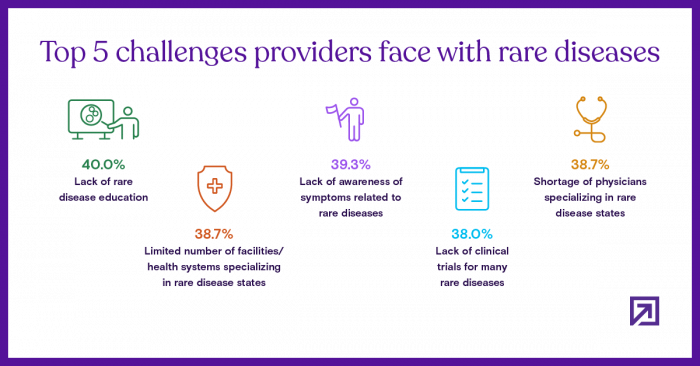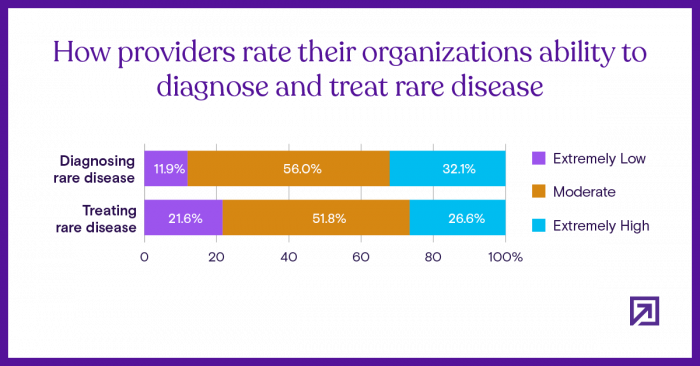Increased Education Crucial to Improving Rare Disease Care, Survey Finds

Healthcare providers involved in diagnosing and treating rare diseases believe that increased physician education and collaboration with specialized facilities will have the greatest positive impact on treating these conditions over the next five years, according to results from a 2021 survey.
Definitive Healthcare, a healthcare commercial intelligence company, conducted the online survey from November to December 2021. The survey sought to better understand the challenges healthcare providers face in diagnosing and treating rare disease patients.
Eligible survey respondents were healthcare providers with a diagnosis claim for at least one of more than 142 rare diseases and who also reported experience diagnosing or treating rare diseases.
One-hundred and fifty professionals from 128 healthcare organizations and hospitals responded to the survey. The top primary specialties of respondents included family practice, congenital and genetic diseases, internal medicine, pediatrics, neuroscience, oncology, and radiology.
The questions included in the survey covered mostly three main topics: current challenges faced by providers when diagnosing and treating rare diseases, how well are organizations equipped to diagnose and treat rare diseases, and factors that would have the greatest positive impact in addressing rare disease today and in the next five years.
In the U.S., rare diseases are defined as any condition that affects fewer than 200,000 people in the country. According to the National Institutes of Health, there may be more than 7,000 rare diseases.
Consistent with the small patient population for each disease, a lack of rare disease education and lack of awareness of rare disease symptoms were the most common challenges when addressing rare disease patients — reported by 40% and 39.3% of respondents, respectively.
Additional challenges, also cited by nearly 40% of providers, included shortages of physicians specializing in rare disease, limited facilities dedicated to rare diseases, and a lack of clinical trials for many disease areas.

Infographics courtesy of Definitive Healthcare
“Providers deal with chronic conditions on a day-to-day basis, but they just don’t see as many patients with rare diseases,” Danielle Johns, public relations/analyst relations manager for Definitive Healthcare, wrote in a blog post. “Because they’re unlikely to see many of these patients, they don’t receive the training and education necessary to recognize symptoms and understand treatment options.”
Moreover, about one-third of participants felt extremely confident in their organization’s ability to diagnose a rare disease, but only 26.6% reported the same level of confidence when it came to treatment.

When asked about factors that could improve the rare disease space today, nearly half of respondents (48.7%) pointed out that collaboration with facilities specializing in rare diseases would have the greatest impact.
Other common responses included experience from patients with similar symptoms, collaboration with research organizations, a greater use of a geneticist or genetic counselor services, and participation in clinical trials.
However, increased education for physicians was the most commonly reported factor for improving rare disease diagnosis and treatment over the next five years — cited by 52% of respondents. More collaboration with rare disease facilities and next-generation genomic sequencing were also among the top three responses for future improvements.
Advances in genomic sequencing will drive costs down and make testing more accessible to patients, which can help providers better understand the conditions rare disease patients face.
“The Definitive Healthcare ‘2021 rare disease study’ highlights the lack of educational resources for medical professionals and providers in this area,” Todd Bellemare, senior vice president of Strategic Solutions at Definitive Healthcare, said in an email to Bionews, publisher of this website. “While providers’ encounters with rare diseases are less frequent, the ability to diagnose and treat these diseases is a critical focus area.
“To improve care for rare disease patients, we need to emphasize funding research initiatives and facilitating more communication between global organizations, which would improve education for providers and increase collaboration among them.”
Click here to download a free copy of the study.





